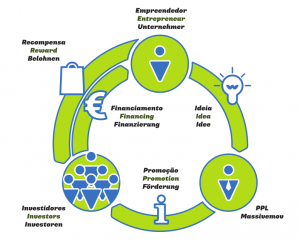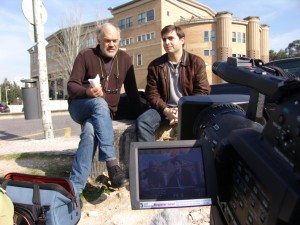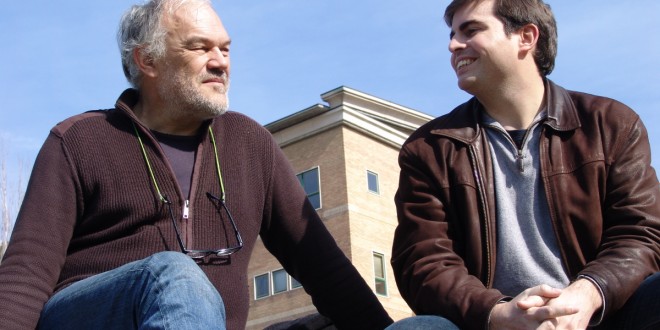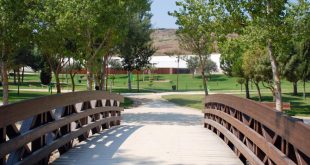Imagine you wake up one fine morning with a dream in your head that won’t go away. No matter how much you try it just stays there. Now your dream begins to take shape. Your idea is joined by shapes, colours, sounds. You start to feel it crystallise in your imagination, to hear it, to see it before you, to smell it in your nose and taste it on your lips. Your idea grows. It’s time to get up. The day begins and you imagine that everything was just a nice dream. Because however good the idea was, it’s just the money that’s missing. You don’t have the contacts or the knowledge to put your dream into practice. So you could leave it at that, or maybe not.
 Win.Win.Win.
Win.Win.Win.
Crowdfunding?
Don’t start thinking about the people who keep making things miserable for you day after day. Think about yourself, and don’t stop. Concentrate purely and simply on your idea and write it down on a sheet of paper, on your laptop, anywhere … even on a restaurant tablecloth. Talk to your best friend about it and try to persuade him or her about your idea. If you manage to do that, talk to your brothers and sisters, your parents, your neighbours and confide in your closest friends. Persuade seven or eight people to support you. Now you set about writing your idea up as a story, about turning your dream into reality. If you believe in yourself, you will win.
Pedro Almeida Vieira is a journalist and writer and dreams of setting up a library with historical works in part by unknown Portuguese authors. But that will cost him 1,000 euros which he hasn’t got. But he does have an idea…
Henrique Pereira dos Santos (53), who is a landscape architect and chair of the ATN association, has a different idea. For ten years, his association has been caring for an area of 875 hectares of natural landscape through reforestation and forest fire prevention. ATN looks after the flora and fauna of the Faia Brava project in northeast Portugal in the municipality of Pinhel between Viseu and Bragança, and they now need a contribution of 1,000 euros. Who might be able to help?
João Figueiredo wants to link Faro to Lisbon and Porto. He’s dreaming of a car-pooling centre like the ones that have existed for decades in many other countries in Europe, but not yet in Portugal. He wants to turn his dream into reality. But to do so, he needs a website with very special software. The cost: 1,500 euros.
Frankie Chavez is a musician and he comes from Lisbon. He turns his ideas into reality on his different guitars: blues and folk. Now he wants to record his third CD and for that he needs funding to the tune of 5,000 euros. Where can he find such a sum?
Filipa Rocha (26) and Silvino Henriques (25) from Porto live for their healthy, sweet, sugar-free jelly bears, containing no animal gelatine. They want to go independent with the product Nutrally. But they need funding of 5,000 euros to do so.
Six people, five projects from the 61 that have now been implemented in the past 18 months through crowdfunding, which is still in its infancy in Portugal.
www.ppl.com.pt from Lisbon (35 projects) and www.massivemov.com from Porto (26 projects) are the first platforms in Portugal to be promoting crowdfunding. ECO123 spoke to the manager of PPL, the 28-year-old software engineer Pedro Domingos about the successes of crowdfunding in realising the ideas and dreams of young people in Portugal.
In front of the Catholic University in Lisbon, Pedro Domingos spoke to ECO123 about financing and the creation of new jobs in Portugal.
 ECO123: Crowdfunding has been in existence in Portugal for just over a year. It’s a fledgling scheme that’s still getting on its feet; will it also be able to fund employment in the future??
ECO123: Crowdfunding has been in existence in Portugal for just over a year. It’s a fledgling scheme that’s still getting on its feet; will it also be able to fund employment in the future??
Pedro Domingos: Yes, without doubt. We have already had a couple of cases of small start-up businesses which were creating jobs for themselves. For example, we had two designers who are making a documentary. And at the same time they are creating their own employment and promoting Portuguese handicrafts.
Have you any idea who the people are who are providing the finance for crowdfunding?
Yes, we know, especially from geographic and demographic data, that they live all over the world. Although they form the majority, it is not only people from Portugal. About a third are foreigners. We get support from the United States, Australia, Germany, France. It also depends on the projects. For example, Luís Tinoco, a classical music composer, has a great following in Germany. Bands like Primitive Reason have fans all over the world: Australia, United States. So these people also come and support PPL, because the website is in Portuguese and English. We have PayPal available for people outside Portugal.
Has there been any fraud during this period?
To date, there has been no fraud or wrongdoing. Checking begins before the projects are published, when we monitor them. We talk to the promoters, we try to get a better understanding of their idea and whether the people are capable of implementing it if it does get funding. The whole process, the whole crowdfunding campaign and later the financing itself are closely monitored to ensure that the project is implemented and the rewards are delivered.There have been a few delays, but this is not harmful. It is not a case of fraud with people running off to Brazil with the cash. This is because crowdfunding contains a self-regulating mechanism whereby the first people to support a project are a circle close to the promoters: family members, friends, friends of friends. This close circle is very important for gaining credibility and critical mass, and for attracting the wider public. This mechanism helps to reduce and avoid fraud. Both in Portugal and worldwide, and on all platforms, we have seen the same situation.
Is your relationship with the bank BES competition or cooperation?
It is cooperative, because they are different segments. We also had social projects, and if we had continued with them there could have been some competition or cannibalisation. And BES Crowdfunding is better suited to this target group. So, there is no competition because we concentrate more on creative, more entrepreneurial projects. The two platforms complement each other..
What is the background of the founders of PPL?
We met during the MBA at the Universidade Católica and the Universidade Nova. And from the moment the Catholic University started supporting us, we held the first event on crowdfunding in Portugal with the collaboration of the university and the Calouste Gulbenkian Foundation. BES Crowdfunding is just one of PPL’s clients. PPL manages the BES platform with the expertise we have in the field of crowdfunding. As such, the analysis of projects and the decision-making is always the responsibility of BES.
How much do you earn?
That is still to be fixed. I teach here at the Catholic University and other colleagues of mine too. So we are still working something out between €1,000 and €2,000 which would allow us to pursue this with more professionalism and dedication.
And how does PPL earn its money?
PPL’s business model is very simple: we get 5% of the amount raised. So if a project gets funding of €5,000, we are talking about €250. If the projects fail to get funding, i.e. if they only reach 80% of their target, all the money is returned to the supporters and PPL does not charge any commission. So we share the risk of financing the projects. Then we have another, more recent source of income which we call white label, which is the sale of the platform to clients, or managing it for them as is the case with BES.
What are the rules and who takes the decisions about whether a project goes ahead or not?
The criteria are described on our website.
But we are interested in the information which is not published on the site. Because in the end there is always someone who takes the decisions and does so unanimously or with a majority. How do you take decisions at PPL?
Yes, by a majority vote. But we don’t have the power to decide about all the projects. We have already received architectural projects and we don’t have the necessary expertise to take decisions about those. What we do is to turn to partners in such areas who help us to take a decision and assess a project. Then we also assess other criteria, such as how the project will be publicised. Because it is not enough to make a page for the project, the campaign on the PPL website, and hope that the cash arrives or people stumble on the website. Promoters need be more pro-active and have more drive.
But 80% of projects fail at the outset…
To date, we have had 450 applications. Of those, about 20% were published on the website and about half, or some 40%, have been financed. The rest haven’t. So, here it is the public that takes the final decision about the project’s validity, with their contributions and support. And to be honest that is the path we would like to follow, so that we wouldn’t be playing God, so to speak, in any choices and would allow the general public make the choice in a more democratic manner. However, we get projects which are still very much at an embryonic stage, and even before the funding stage they need a different kind of support. So, we pass such projects on to other companies for incubation or acceleration, partners who can develop the business.
Do you need someone like Bill Gates? Is there a need for some people who, for example, really want to drive the Portuguese economy forward?
We have a number of patrons, some supporters who are already loyal, very loyal. They have already supported more than one project, some have supported more than five or six. Yes, it would be good to have more supporters.
What dreams do you have for the future?
Our dream would be to have a different type of crowdfunding, with a different type of return. To have a financial return for investors. That’s what I would do. We would be able to appeal to a different public whose motivation is not just to support a relative’s or a friend’s project, but rather to get a return on their investment. We’re talking here about peer to peer lending, so loans from person to person, and equity crowdfunding, i.e. investing in equity.
Money is(n’t) everything, is it?
No, no. Obviously it is important. Without any money, you can’t pay for basic necessities. Once these are satisfied, money is much less relevant than other factors in taking decisions which bring us happiness.
What do you have in mind when you hear the word money?
Often it is what makes us take certain decisions, but it ought to be the last reason for deciding to follow one path rather than another.
Clarity?
That’s what’s needed for taking good decisions and choosing the best direction to go.
Honesty?
It is the most important thing and the best way of getting to where we want to be and of having more success. Being honest.
Transparency?
This is connected with honesty. Being a person of integrity, being transparent in order to have the best people alongside us. And to do what we want and wish for.
Prosperity?
All of us want to enjoy success and good health so that we can manage to do what we want throughout our lives…
Profit?
There are different forms of profit or different types of return. We can see that even in crowdfunding there is profit. People are looking to support projects which give them a return, a profit. And this profit does not always come in monetary form. There are people who are looking to make a different kind of impact: cultural or social. So … profit! There are several types of profit.
Growth?
Growth is what we hope to create with PPL and crowdfunding. Growing, having more impact, making our actions reach more people and succeed in improving the lives of more people.
Do we need unlimited growth in the economy?
Our resources are limited. So it is impossible to have unlimited growth infinitely, perpetually unlimited. Now, it also depends on the type of growth, doesn’t it? In terms of knowledge, perhaps it can always be added to. We can always increase our knowledge.
And trust?
Trust brings us to a story I heard the other day, where a tourist went to a shop in India where there were a number of jars containing lizards, but one of them didn’t have a lid. He asks the shopkeeper why the lizards don’t escape from the open jar. To which he responds: “No, no, the lizards are Portuguese. As soon as one tries to climb up, the others pull him down again.” This is just to show that people are sometimes envious of other people’s success in Portugal.
It’s probably part of our culture, but on the other hand we can see that the Portuguese are capable of showing other good characteristics. Of generosity. As soon as they understand and begin to trust the concept, they help and participate in the projects, both those of a social nature and others. As a people, we have our special characteristics like any other, with advantages and disadvantages. Our challenge is to adapt the crowdfunding tool to the culture of our country – which is different to the culture of the United States or the United Kingdom, where patronage of the arts is much more widespread. But on the other hand we also have people who are full of inventiveness, with plenty of creativity. So for Portugal, it is a matter of adapting the tool to our country.
Wir bedanken uns für das Gespräch.
What is crowdfunding?
- “Crowdfunding” is the gathering of funds from private investors for a project. Each project creator (capital seeker) describes their project, defines the amount of money they need and the time available for gathering the money.
Who is behind crowdfunding in Portugal?
- In Portugal, crowdfunding is managed by the two internet platforms PPL (Lisbon, http://www.ppl.com.pt) and Massivmove (Porto, http://www.massivemov.com). The project creator (capital seeker) must register with PPL or Massivmove in order to be able to present their detailed project proposal on their websites. The presentation is done in writing and is supported by a short film. Both platforms gives guidelines about what types of project are permitted. There are, for example, ideas from the fields of design, technology, foodstuffs and furniture, but also art, handicrafts and entertainment. About one project in five is accepted and published. And of those, more than 40% are successful. The average capital of a successful project is close to 3,000 euros. Both platforms have already raised more than 200,000 euros.
How does crowdfunding work?
- Once a project is opened to the public (published) by PPL and Massivmove, any private individual, company or association can register as a potential investor with any amount they like from €5 upwards, after registering on the websites of the internet platforms. If the desired minimum sum is not reached within the period specified, the funding is treated as having failed. The money is then not transferred, but paid back. However, if the funding is achieved within the specified period, each private investor gets something in return for their money from the project creator (capital seeker). The capital does not have to be paid back. In the case of a successful result, both platforms charge an arrangement commission of 5% of the sum achieved.
Neither platform lays any claim to ownership of the projects or their products. However, all projects are permanently archived and remain accessible to the public. If financing is agreed, the project data and the uploaded media files can no longer be changed or removed from the website.
PPL and Massivmove give no guarantee about the delivery of the agreed services or the correct use of the money assigned, but they monitor each of the projects to be implemented. PPL and Massivmove advise all investors to rely on their own judgement when selecting projects. All project creators (capital seekers) are warned that they could be liable for possible claims for damages from their investors if undertakings are not complied with.
 Eco123 Revista da Economia e Ecologia
Eco123 Revista da Economia e Ecologia


